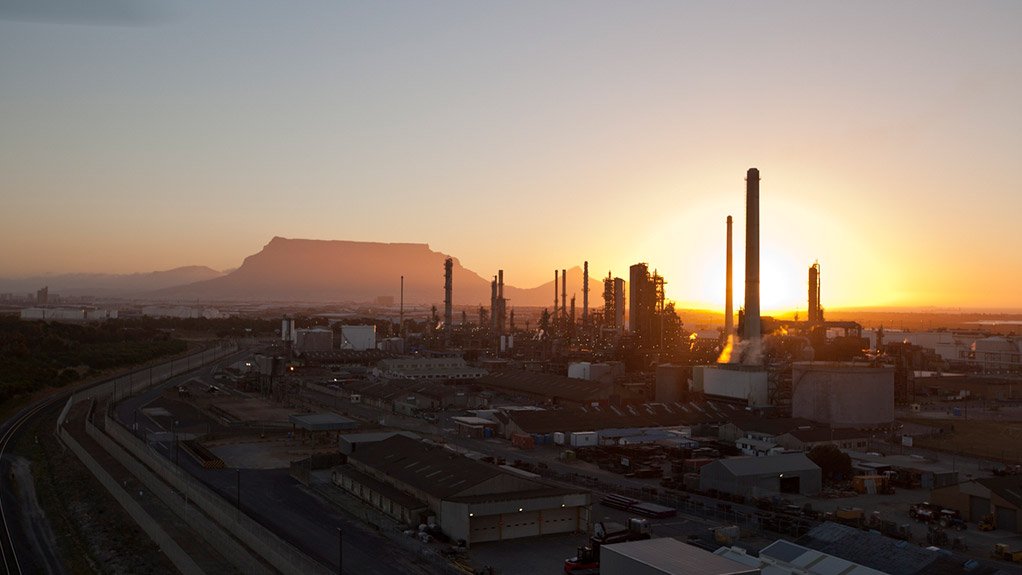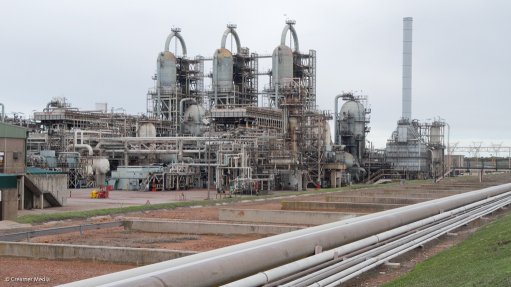As domestic oil-refinery debate continues, study highlights big jobs contribution
The employment and economic spin-offs of South Africa’s domestic oil refining sector have received prominence in a new study, which suggests that the country’s six refineries generate yearly economic activity of more than R200-billion and sustain more than 480 000 jobs.
The study, titled ‘The Petroleum Industry’s Contribution to South Africa’, was commissioned in 2015 by the South African Petroleum Industry Association (Sapia) and has been compiled by KPMG, using 2014 data.
It comes amid ongoing uncertainty over the future of the existing refinery fleet, which is ageing and which will require significant investment if it is to be able to meet the country’s tightening fuel specifications.
In 2012, government set a July 1, 2017 deadline for the introduction of new cleaner fuel, using specifications that are largely in line with Euro V emission standards.
However, following years of wrangling over how the investment costs will be recovered, government has confirmed that it will not enforce the deadline.
No new timeframe has been published, but some visibility of the transition could be given when the Integrated Energy Plan (IEP) is released for public comment in the coming weeks, following Cabinet’s approval to do so on November 3. Work streams have also been established between government and the industry to study the various options over the coming year.
Nevertheless, a number of South Africa’s refineries, which have a combined capacity of 703 000 bbl/d, are producing petrol and diesel that is not compatible with the demands of some of the newer automotive engine models, which has led to a significant rise in imports.
Some have even argued that South Africa should take advantage of the global glut of liquid-fuel refinery capacity and rely increasingly on imports.
Government policy, however, is supportive of ongoing domestic refining. While there have been significant delays in finalising an acceptable cost recovery mechanism for the upgrade of the existing refineries, government remains supportive of the idea of building a 200 000 bbl/d greenfield refinery at Coega, in the Eastern Cape – a project that has hitherto failed to materialise.
Sapia president Maurice Radebe says the study is designed to offer a holistic view of the petroleum industry supply chain and provides quantitative evidence of the industry’s economic and employment contributions.
He stresses that the figures are also confined to Sapia “integrated members” (Sasol, Total South Africa, Chevron, BP South Africa, Engen, Shell, PetroSA and Sapref) and their liquid-fuels operations. The contribution of chemicals and lubricants is, therefore, excluded.
KPMG senior economist Jeaunes Viljoen reports that the study found that the Sapia members contributed R9.7-billion in capital expenditure and R200-billion in revenue in 2014.
The total economic impact as a result of both capital and operational expenditure in the year was R324-billion, or 8.5% of gross domestic product (GDP), while the sector reportedly sustained more than 96 700 direct jobs across the value chain, from crude oil extraction to retail. The indirect and induced jobs associated with the value chain are stated at over 692 000.
“Refining activities contributed the most additional economic activity of R213-billion, with retail activities, excluding convenience stores, contributing the second most of R80-billion,” Viljoen reports.
Refining activities also sustained the most jobs at 484 478, she adds, despite direct employment in refinery activities being far lower at 4 809. The balance of the jobs are determined to be indirect or induced.
The study found the total employment impact in the retail sector to be 221 580 jobs, including 70 000 direct jobs.
Department of Energy deputy director-general for petroleum and petroleum products regulations Tseliso Maqubela welcomed the study and said it helped reaffirm government’s position that South Africa should retain and grow its refining capacity, rather than rely increasingly on imports.
“I have not looked at the study in depth, but I think it indicates that we should not be exporting those refinery jobs. We actually need to make sure that we sustain jobs through maintaining that capability,” Maqubela said.
He also indicated the IEP would offer insight into the future options for the South African liquid fuels sector.
Comments
Announcements
What's On
Subscribe to improve your user experience...
Option 1 (equivalent of R125 a month):
Receive a weekly copy of Creamer Media's Engineering News & Mining Weekly magazine
(print copy for those in South Africa and e-magazine for those outside of South Africa)
Receive daily email newsletters
Access to full search results
Access archive of magazine back copies
Access to Projects in Progress
Access to ONE Research Report of your choice in PDF format
Option 2 (equivalent of R375 a month):
All benefits from Option 1
PLUS
Access to Creamer Media's Research Channel Africa for ALL Research Reports, in PDF format, on various industrial and mining sectors
including Electricity; Water; Energy Transition; Hydrogen; Roads, Rail and Ports; Coal; Gold; Platinum; Battery Metals; etc.
Already a subscriber?
Forgotten your password?
Receive weekly copy of Creamer Media's Engineering News & Mining Weekly magazine (print copy for those in South Africa and e-magazine for those outside of South Africa)
➕
Recieve daily email newsletters
➕
Access to full search results
➕
Access archive of magazine back copies
➕
Access to Projects in Progress
➕
Access to ONE Research Report of your choice in PDF format
RESEARCH CHANNEL AFRICA
R4500 (equivalent of R375 a month)
SUBSCRIBEAll benefits from Option 1
➕
Access to Creamer Media's Research Channel Africa for ALL Research Reports on various industrial and mining sectors, in PDF format, including on:
Electricity
➕
Water
➕
Energy Transition
➕
Hydrogen
➕
Roads, Rail and Ports
➕
Coal
➕
Gold
➕
Platinum
➕
Battery Metals
➕
etc.
Receive all benefits from Option 1 or Option 2 delivered to numerous people at your company
➕
Multiple User names and Passwords for simultaneous log-ins
➕
Intranet integration access to all in your organisation





















